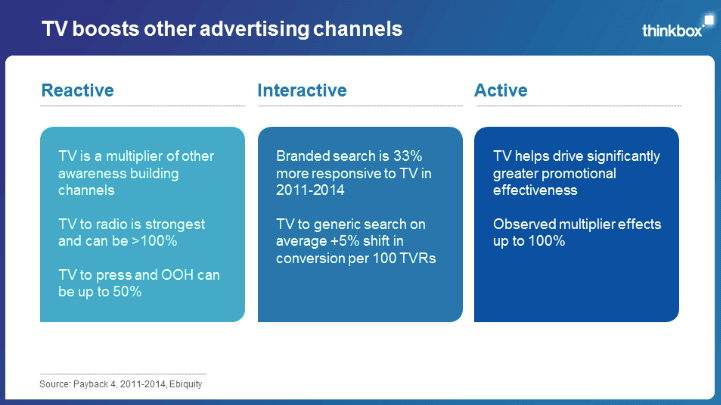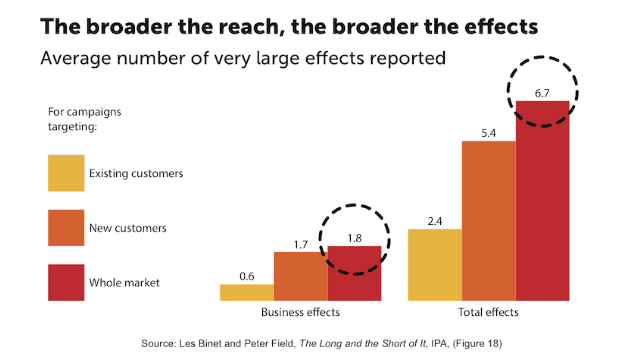It’s not about digital or traditional, those don’t exist. It’s about integrated marketing communications. Different channels do different things and that’s the point
Lots of marketers will tell you that it’s possible to build a business using just online channels but that’s just not true and most of these people are selling tactical solutions, they may be good at what they do, but be careful. They reference examples such as Facebook, conveniently forgetting that Mark Zuckerberg and Facebook were all over US national television, gaining free coverage to tens of millions of people.
Tie both shoelaces, not just one
Integrated marketing communications is all about linking these things together, recognizing that one media channel is not going to save the day and that it’s often better to do a bit of everything than a lot of one thing. You can walk better if you tie both your shoelaces.
The better the media mix, the better the reach
Here is a piece by Thinkbox, the marketing body for UK commercial TV advertising. You can argue that they have bias towards TV but the point here is that even with a margin of error you can see how combining multiple channels helps drive efficiency and effectiveness of media spend.

Now, what about those who can’t afford television?
I concede here because media budgets are a massive part of a successful recipe. It’s hard to bake a cake if you’re short on flour and it’s the same with media spend. I’m sorry but it’s harder for small businesses with less money. But that doesn’t mean you shouldn’t try.
That is why integrated marketing communications and spending money in the right way will still make a massive difference.
I’m not going to write that you too can gain overwhelming success by following these tips and secrets and blah, blah, blah, Marketing is not as simple as that and anyone promising quick-fix solutions don’t know what they are doing, nor do they care about you.
However, I will state that regardless of your budget. Regardless of your resources, it’s often better to make sure that you are assessing all the available media channels that can help you to reach your Marketing objectives as per your strategy, if you have a strategy, but that’s another article.
A simple example of this is again, Facebook, who received free mass coverage by doing TV interviews about their, at the time, new social network. I will reiterate that prime time US TV numbers in the tens of millions of viewers. That’s incredible reach and it absolutely would’ve helped Facebook to grow its awareness and sign-ups.
If they decided to wait for people to refer each other by word of mouth or via email then it’s very likely that the site wouldn’t be anywhere near the size it is today. It probably would be another Bebo.

The goal of every business is to grow or at least maintain itself. Let’s look at some practical examples you may have experience of
Take for example SEO, which is famously a very technical and complicated discipline with specialists in their own right. But optimisation of websites and content are not the most important things here, not for communications. A fully optimised site and the content within are a measure of efficiency, not effectiveness. If the content on that site isn’t valuable or useful to potential customers then it doesn’t matter how many technical tricks you use to leverage better results, it’s going to hit a ceiling regardless.
This is unfortunately why SEO can get a bad reputation because it doesn’t generate demand, it is mechanical surgery and yes it fixes your car up to make it faster but it can’t promise you that it’ll make people love the car when you try to sell it next month.
Efficiency is doing things right, effectiveness is doing the right thing
Part of this issue is Marketers who don’t know what they are doing. They hire specialists like SEOs and expect magic, failing to recognizethat they themselves need to have a strategy for the business and secondly that it is their jobs to make sure customers are actually aware of the brand at the top of the funnel.
You can’t sell what people don’t know about or care about.
A simple way to increase a website’s organic search ranking is through other media coverage. Do more than just the one thing, don’t have biases towards or against certain media channels. Do what is right, not what everyone else is doing. It’s not all about search, social media, retargeting and SEO.
An example; a press release about a new product launch published in a quality news site or even on TV. Interviews are great because the audience knows you aren’t paying for it, it’s contextually more effective in selling what you do. The contextual relevance and trust worthiness will do a brand massive favours over the short and long term.
If the product is great, the interview memorable then the search rankings will follow because curious potential customers will look it up.
Although it’s difficult to directly measure and attribute the media spend to the search rankings, it’s important to know that reach is absolutely one of the most important measures of marketing communication success. Thus the two are clearly correlated.

The Long and the Short of it by Les Binet and Peter Field is one of the most important pieces of media research to come out in the past decade. I seriously suggest you check it out in full.
Targeting the whole market using mass reach techniques results in far more positive effects. Effects meaning anything from revenue increases, customer retention and profitability.
Customer retention? Through reach? Yes, look up Byron Sharp’s double jeopardy law.
This is quite general in approach, I would always advise clients that I need to work with them to perform the necessary strategic legwork first. This will ensure that the right media channels are selected to suit the objectives. Communications planning is around 8% of Marketing as a whole and it’s really the very final stage.
I would advise anyone else in Marketing to do the same or to find someone who can.
However, I will always say that you should never, ever, use only a single media channel. Spreading a little bit of your budget and effort across multiple platforms will always make your pounds and dollars work harder.
It follows the same principles as compounding in financial investment. Spread thinner, play it longer, better results overall.
A word of warning
In conclusion I offer you a warning about those who try to tell you to spend everything in one way or another. Money is precious and it’s important for every Marketer to squeeze tight on agencies and consultants who are offering you tactical solutions. Your job as a Marketer is to make sure you get the most bang for your buck for your clients and your employers.
That goes for more than just efficiency, ROI is a common but terrible metric as it’s just a point on a curve. Want great ROI? Just reduce spend.
What you want to do is figure out how channels complement each other, that’s how you ascertain your effectiveness and efficiency, combined. If your customers are people who spend a lot of time listening to the radio and watching YouTube videos then spread the money to suit. Get them in both places. A simple example but you get the point.
Even the most digitally biased gurus who proclaim the death of every other media, which is frankly nonsense, attend countless “traditional” media conferences to gain positive publicity, another tactic that builds reach and fame.
Gary V has been all over TV, he’s been interviewed in publications, he writes books for god’s sake, that’s about as old school as you can get.
Ask yourself this, your budget may be limited, your time short but how can you tie all the media options together into a tight knot that will make things both more effective and efficient for your Marketing?
By being aware of integrated marketing communications.
